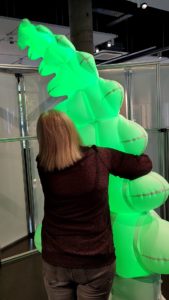Dr Kerry Harman from Birkbeck’s School of Social Sciences and Ms Caroline Firmin and Ms Dominique Davies use this blog to reflect on a recent exhibition they attended entitled ‘AI: Who’s looking after me?
I’m a senior lecturer at Birkbeck with a particular interest in invisible labour and marginalised knowledges. My interest in this area has led me to collaborating with Ms. Caroline Firmin from Birkbeck, Ms. Dominique Davies from Birkbeck and researchers at the University of Manchester on a case study entitled ‘Reimagining Homecare’ which explores sensory ways of knowing care. Caroline and Dominique are both homecare worker-researchers, and the ‘Reimagining Homecare’ project is part of a larger three-year AHRC funded Care Aesthetics Research Exploration (CARE) project.
In August, Dominique, Caroline and I attended an exhibition entitled AI: Who’s looking after me? We all found the exhibition extremely thought provoking, so much so that we all kept thinking about it for days after we’d visited. As Caroline rode home on the bus (it was a long trip) she pondered the question: ‘can AI play a part in homecare’? It wasn’t the first time she’d thought about AI and homecare as it has been a focus of discussion within the field of homecare. What follows is a combined critical and poetic response from the three of us:
‘AI: who’s looking after me?’ – well one response to that question would be the 1.62 million people working in Adult Social Care in England (skillsforcare). Of this very significant number of workers, 82% are female, the average age is 45, 23% have black, Asian and minority ethnicity and 16% have a non-British nationality. Almost a quarter of the adult social care workforce are employed on zero-hours contracts. Did we hear from or see any of these workers in the exhibition? No, but their silence was deafening and reverberated in the photographs of interiors of outsourced AI worker’s homes in the Global South in ‘The future is here’.
The future is here
I’m an elderly person of a great age past my eighties and keeping the rest a secret.
I’m bedridden I need help from carers to help me get washed dressed change my pad .
Hoist me from bed to armchair. Give me my medication. Make my meals and drinks .
Do my laundry and housework.
My family do my shopping and see to bills . I do need quite a bit of support.
Can AI give me that kind of support? Can AI greet me in the morning with a smile on its face ? Can it respond to my needs, does it know how I’m feeling?
Will AI talk to me and tell me what is happening outside where I live? For example, what is the weather like outside today? Is there anything new going on? Did you see any neighbours?
Does AI know when I need a doctor.
Does it know my thoughts and feelings? How do you have a relationship with AI like I do with my carers and family?
Can it sense moods? Can it sense changes?
We rely on technology everyday, sometimes it’s frustrating. Mostly we adapt to technology, because we don’t have a choice.
Can we do without technology? We use our phones, laptops, bank cards on a daily basis but when these go wrong what happens?
What if AI goes wrong? Who cares for me now?
Does AI have a place or contribute to homecare?
What is AI? what does it do?
Many of us have heard of AI but I don’t think we fully understand what it means. How is AI made and who programmes them? What role do they play in our lives?
Can they play a role in our lives better or worse than humans?
Can AI be corrupted, can it be trustworthy? Would the person receiving care be comfortable with AI?
Can AI help the blind, deaf, disabled, wheelchair users, mental health, dementia/ Alzheimer’s? How would the elderly understand communicating with AI?
Is AI here to stay forever and replace human feelings, touches, senses?
I think humans need human touches and human responses. I think it makes them feel more connected….
For me, ‘Who’s looking after me?’ spotlights the question of ‘what does it mean to be human’? Visiting the exhibition prompted me to read ‘The Inconvenience of Other People’ by Lauren Berlant. Berlant provides a detailed exploration of the impossibility of sovereignty and argues that politically we need to learn to work with the ambiguity that the fantasy of sovereignty creates. I contend that in many ways AI could be thought of as a human response to the human desire for sovereignty. In other words, because people are ‘inconvenient’ we seek to create a world where we can bypass them. Enter AI. However, as Caroline and Dominique both ask, can AI replace ‘care’? And even if it could, this raises a bigger question: if we humans are going to go to the trouble of teaching machines ‘to care’, why not invest in teaching humans to care more for each other and the world? Why do we want machines to do that? As Berlant maintains, people (and things) ARE inconvenient, but we need to move beyond the fantasy of sovereignty as we continue to bump into each other in this world. Creating machines that can ‘care’ will not address the fantasy of human sovereignty, it will only mean that we need to develop new ways of relating to things. While the possibilities generated by new types of relations and relating should not be foreclosed, the fantasy that this will lead to greater sovereignty needs to be abandoned. In other words, we need to learn better ways of getting along together.
The future is here
I feel like a robot – robotic, when I’m performing care.
Perhaps the future is here?
…so lots of questions as we continue in exploring care aesthetics and sensory ways of knowing care.
More Information:


